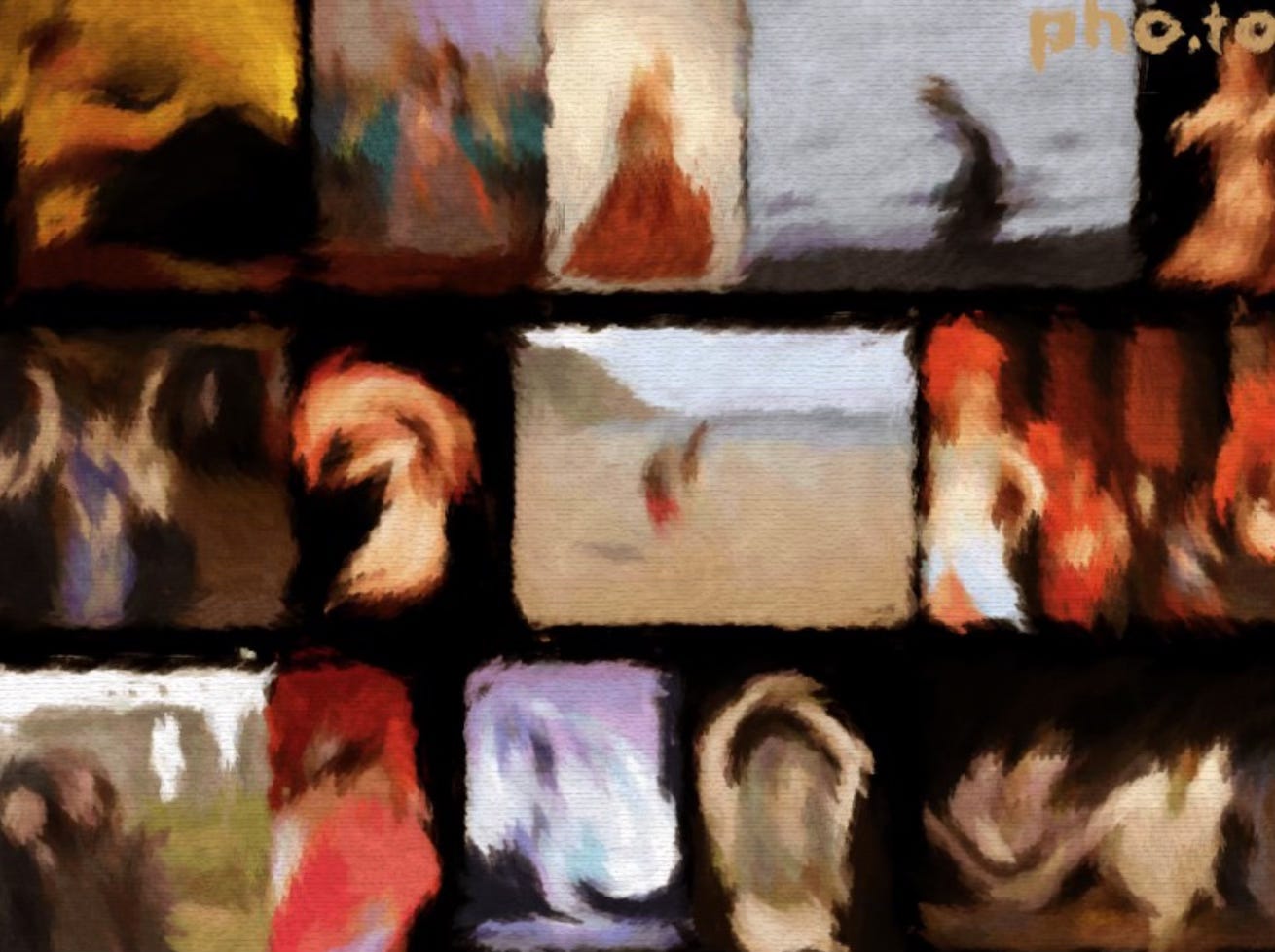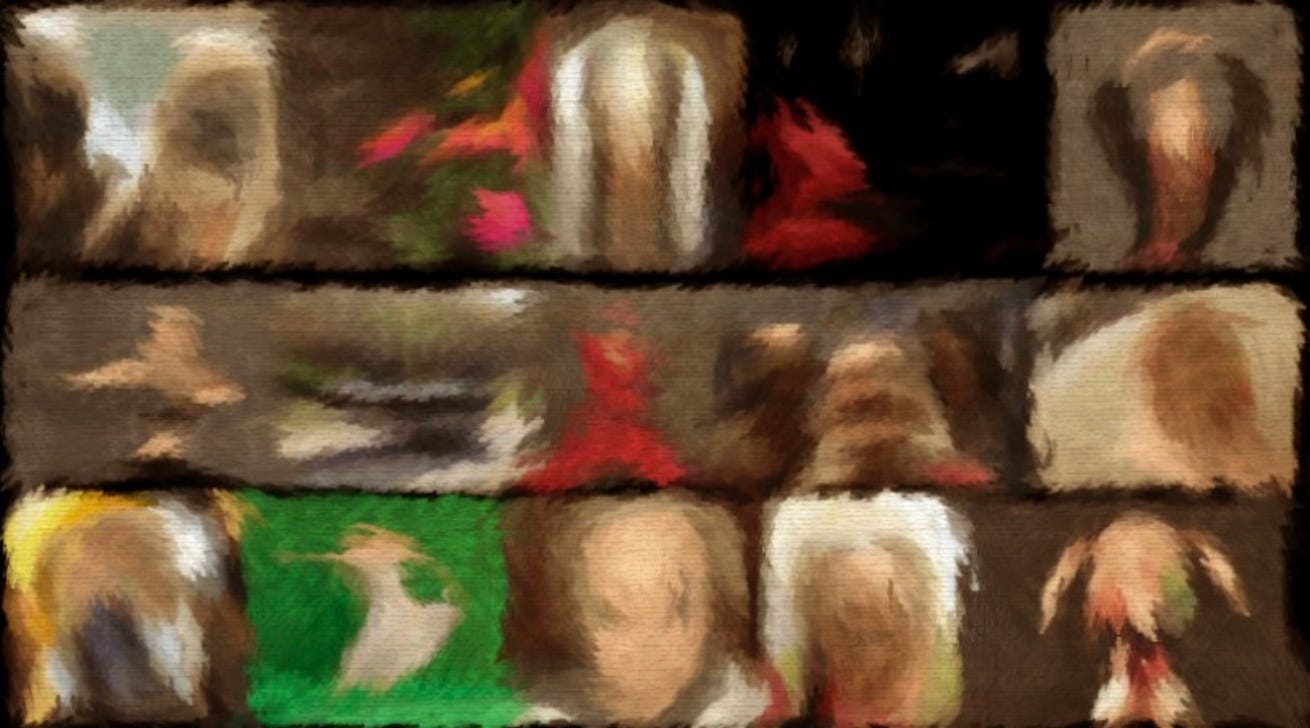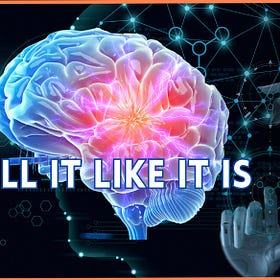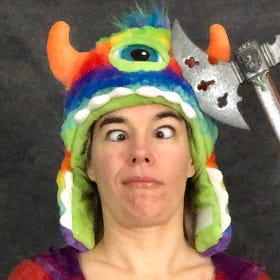Forgetful Lucy: Anterograde Amnesia
The fuzzy Impressionist paintings that are my memory
Lucy Whitmore - Forgetful Lucy from 50 First Dates:
Although one of my most significant injuries is to my left temporal lobe, I don’t actually have “Goldfield’s Syndrome”. Nobody does. It was a fictitious ailment they made up for the movie.
The fact that they could have used the real condition, called Anterograde Amnesia,1 is one of my annoyances about this film. And yes, the show is rife with racial, gender, and other prejudice jokes, stereotypes, and white casting of a major POC role.2 Another common complaint: is this love or is it the creepy stalky-hunt of a player trying to take advantage of a disabled girl?
First, consider the genre. It borders on slapstick at times. Even Adam Sandler's portrayal of the Commitment-Phobic Playah is over the top (c'mon, it's Adam Sandler), so if you're looking for a realistic portrayal—of anything, much less a healthy romantic relationship ideal—you need another genre.
I would suggest one to you, if I could.
But how many other movies can you name that tell someone like me that I'm worth loving as I am? That I'm worth tenacious pursuit in spite of the herculean obstacles in the way of getting close to me? That I'm worth the time and energy it takes to really learn about my conditions, much less how to engage with them in a way that works for both of us? That I'm worth coming up with creative solutions in order to STAY close to me after The Almighty Conquest of "Yeah, man, I fucked a belly dancer!" Or after obtaining that White Knight Quest Prize?
Such questers are often quick to shove me back onto the shelf—and I’m not merely referring to the romantic shelf—when they realize that the reality of dealing with me and my disabilities are way heftier than they signed up for. (It’s weighty and full of complication, so I don’t blame anybody for not wanting to get intimate with all that.)
Unfortunately, for too many of us with these types of conditions, the norm when someone does “keep” us is not intimacy and love. It’s control and abuse.3 That’s how it’s been for me every time since acquiring my first TBI. After all, it’s easy to snow somebody who can’t put whole pictures together very quickly, and who is already drowning in the battle to merely survive. It’s even easier to get away with abusing somebody who can’t remember what you did to them the next day.
Now doesn’t that just make for an inspiring rom-com or love story plot line! So there are not a lot of movies, novels, comics or otherwise to provide a desirable story time role model for somebody like me.
I mean, how many tales about a Dain Bramaged protagonist can you even name?4
Now how many did not acquire their injuries via combat or athletics?
And how many of those portray the realities of living with permanent brain damage in a hopeful, inspiring way?
And how many of the tales do not focus on the injury and initial recovery process (when everybody and their brother flock in to help for the first couple months), but rather focus on what it takes to create and sustain a meaningful, enjoyable life with people who truly enjoy the protagonist as they are now?
And how many portray this survivor in any sort of attractive, alluring way?
Yeah. Me neither.
The conditions I live with are so infrequently portrayed onscreen or in fiction, whether inspirational, realistic, or comedic. When we are portrayed, usually we're not protagonists.
As such, 50 First Dates remains dear to my heart because certain aspects of it hit the nail on the head. (Badum-tss. I didn't even try for that one. Only realized it amidst editing.) 🤪
People also rag on this movie because it makes light of a truly difficult situation. But at least somebody was talking about TBI in an uplifting manner for half a millisecond. It is better now than it was back in 2020 when I published the original version of this post on my old blog. But we still have lightyears to go.
I have found that the reality of brain injury is something few people genuinely want to know about, much less discuss in depth. It can happen so easily, and it happens more frequently than anybody wants to imagine—yes, to “regular” people too, not just our combat vets and sports icons.
To crack open the subject through humor and romantic comedy is perhaps a first toe-dip into acknowledging this scary and uncomfy reality: yup, it could happen to you every day you get into a car or walk down the stairs with things in your hands. It could happen to your kid every time they go sledding or skating or toddling too fast toward the table at two.
I’m really bummed that so many of the important clips of this movie are rife with the off-color and denigrating caricatures of other marginalized populations, and of the TBI patient extras. Because without that, I could refer you to so many more scenes without a second thought.
The reality of this condition truly is a nightmare, and there are so many gems in this movie that provide a small-bite, lighter introduction to our particular corner of the Underworld that the average clueless person might find easier to swallow than my customary sledgehammer fire-hosing.
So thank you, Adam and Drew, and the 50 First Dates Crew!
Because the world—even the disability world—doesn’t like talking about us, and conversations turn especially squirmy when we talk honestly and uncensored about ourselves. Some of it is simply that “suck it up, don’t be a wuss” bullshit.5 But I think a lot of it is because people don’t want to imagine what it would be like if it happened to them or someone they love.
I do not blame anybody for squirming away from this topic. I'd love to squirm away from it. Not really an option.
Who are we without our memories?
CAN we actually call ourselves Ourselves without them?
I don't. I have a ghost haunting my brain. Her name is the one I was given at my birth.
THE IMPRESSIONISM WING OF MY MEMORY
Except for scary, painful or traumatic stuff, I don’t make many clear memories anymore. I mostly make Impressionistic paintings. The museum gallery of my mind is divided into two main wings.
Before TBI.
After TBI.
To this day, the Before Wing is full of the clearest, most vivid photographs, videos, and paintings you would swear are photos. Murals span entire walkways, and if you look closely, you’ll discover depictions referencing so many minuscule details.
In contrast, the After Wing hosts Impressionist collections depicting the cycles in my life since that first car wreck. The time periods between them tend to overlap, but these galleries are individuated by the hues and flavors that dominate them.
The Recovery Years - Dec. 2000 - 2004
From the morning after the wreck until about three years later. It's just this fuzzy swath of muted hues and grayscale, pock-marked by flashes of inferno. Doctor's appointments, court cases, support groups, loss, grief, loss, jealousy, rage, a new support system, gratitude, loss, bitterness, betrayal, confusion, acceptance, rage, physical therapy, and the blessed relief when I finally discovered Bowen Therapy, which allowed me to dance again.6 I made my dance drills as my own PT, got married, and took myself to Europe once my civil suit finalized. That was my reward for surviving Hell.
The Triumphant Years - 2004—2007
When I proved the pessimists of my recovery wrong—that I would never be a dancer again, I taught belly dance classes in multiple cities, traveled around Colorado to teach and perform, and produced my own shows with my students and friends. This gallery also includes my introduction to karate, most of my first marriage, and the earliest, wondrous period that launched my international career when I only traveled on occasion.
The Touring Years - 2007—2010
The years when my dance star shot into the heavens, exploded like fireworks, and abruptly disintegrated into falling ash. But my reclamation of an income finally set my first husband and I free from each other.
The Backslide Years - 2010–2013
The years when I tried to keep a desperate claw-hold on the life I’d rebuilt. Unfortunately, I lost my personal assistant—a.k.a. my Lifesaver, my Sanity Maker, and the one who made it possible for me to do my job as a dancer and instructor—just as the economic crash hit. I had six out-of-country gigs fold in a year (over half my income), as well as having to cancel three of my weekly local classes because students couldn’t afford anything except their basic living expenses anymore.
This made me once again financially dependent upon the guy I was living with.
I was one of the many people who never should have been granted a mortgage, especially not when my finances were shackled to someone who over-spent our budget by $200-300 a month, snuck the credit card out of the freezer, and siphoned all the cash out of our savings account—NOT for basic living expenses.
This new living situation took a major toll on my health because I could never take a break from working to recuperate from my travel gigs or other stressful situations. I started having more and more seizures with every year.
It was a Catch 22. I couldn’t afford to move out or get the health care I needed because my career was tanking; my career was tanking because after the economic crash I couldn’t regain the proper momentum to afford disentangling my life from this situation that was annihilating my health.
In addition to my normal brain and spine issues, I lived with a ceiling that dripped arsenic and black mold into my bedroom for a year, and I withstood steady, subtle, subversive injuries from…let’s call it interpersonal assault disguised as martial training "accidents” from several people who were very angry with me. One, because I told him “NO” too many times, and the other because she thought I was screwing her husband.
In fact, he was cheating on her.
Just not with me.
The final incident gave me severe whiplash and a second TBI. It locked my neck into a backwards curve so badly that the vertebrae started to fuse, which set off a year of seizures and did even more neurological damage. When I informed this individual that he had injured me, he just laughed and said, “Oh, honey. I could have hit you so much harder.”
This forced me to move to Arkansas where my parents could help me recover again.
The Reclusive Years - 2013—2019
Upon arrival in AR, my driving clearance was revoked. For the first six months or so, I lived in 95% isolation. It was honestly a relief, and stopped most of my seizures in their tracks. But it meant I had no life outside my own walls.
Then in 2014 I got rear-ended again by a dude not paying attention at a stop sign, which gave me a third TBI and yet another round of whiplash. These new injuries from 2012-2014 occurred right as I got agented and tried to return a revision to an editor from Random House so I could gradually switch my career focus from dance to writing.
Do I need to tell you how that all turned out?
Massive face-splat.
Later, I tried to establish a new dance community and mostly failed. I also had a vastly different martial experience, due to the increase in my physical limitations, a different regional mindset about females, especially females over 40, and the socially crippling symptoms of being booted down to a significantly worse TBI.
Dain Bramage: not so good for the masking of disability and inborn neurodivergence.
I'd had three additional brain traumas, after all, so the painting collection from this time period is fuzzier than the preceding years, and contains even fewer snapshots or video clips of clear memory, even though it's more recent and therefore should be clearer.
It’s not.
Of course, all this time playing alone with my toys gave me my Elements System, so…
The Post-Covid Years - 2020—Present
I actually have a bit more memory from this time period. I suspect it’s because being forced back into isolation by the pandemic immediately gave my brain a break. It needed a break. I had been going too hard for too long, with too few positive results.
Right at the start of the world closing down, I threw one last Hail Mary of an attempt to move my former life as a dance teacher and performer online. But I had only just started to build the foundation for this with Voc. Rehab a few months before. It wasn’t stable enough to launch that quickly with that big of a learning curve.
So I let it go. I had to let it all go. Instead, I focused on writing.
And lo—voila!—I perked right up. Amazing how that happens when an overloaded brain gets the silence, solitude, and rest it needs.
Since then, I’ve slowly been messing around with what kind of instruction, performance, and publishing schedule I can sustain. It really depends on the state of my brain.
Alas. Just as I was really gaining some momentum, I fell down my stairs, sustained another concussion and undid all the years of work we’d done correcting my car wreck-induced scoliosis—which always kicks up my brain symptoms. Two weeks later, my house got flooded by toxins and I woke up having more seizures. Nine months of Government Agency Debacles, back-to-back with the Health “Care” Fiasco put me in the emergency room and kicked off half a year of brain testing, resulting in a hospital stay with electrodes glued to my skull.
BUT!
This finally gave us some concrete answers about what has been going on with my nervous system since 2000, and what has been causing my seizures. Also amazing what happens when you actually test a damaged brain with machines that require electrical juice.
Hence why I’ve been introducing you to all these metaphors of what living with my TBI is really like. That way, when I tell you about my brain crashing in that hospital room, you’ll have the faintest notion of what I speak.
From time to time, I wander through my Impressionist galleries, taking in the general flavor of each of these time periods. Sometimes I go back and read my journals or other writing when I need to remember things in more detail. I definitely have to do it whenever I draft a new memoir tale.
Good thing I keep those records, otherwise the majority of my life since December 21, 2000 would be mostly lost to me. (That's the major difference between me and Lucy Whitmore—I remember my car wreck in stark detail. The fuzziness envelops everything that came after.)
Many of the vivid images I have in my head come from the literal photos and videos that have been shot at important events in my life. I also sometimes regain conscious access to them when I draft them into a memoir tale and spend hours editing them.
But as for organically made memories?
It’s always fun for me to see when color comes back into my life. (Except that big swath of turquoise in the Reclusive Years. That’s the obnoxious tape wrapped around my knee. Hahaha!)
What are we beyond what we remember?
As I mentioned in the last posts, my most vivid memory clips since the big car wreck are from the new traumatic experiences that have occurred since my first TBI. But traumas are stored differently from day-to-day or even intensely sad or pleasant memories.7
If it was flip-flopped—if I had forgotten the traumatic stuff and instead only remembered the good stuff, who would I be?
Oh. That’s right.
I know firsthand how that works. There have been two major trauma periods that I wiped from my conscious memory. The first stayed buried from my toddler years until I was twenty-eight. It took doing two years of intensive EMDR just before I turned fifty to bring the full extent of it to the surface.8 The second was obscured from nineteen until twenty-four.
Both times, those missing memories left marks on my mind like a little piece of bullet that didn't get fully removed. Everything got sealed over, but those chunks festered inside, poisoning everything I did. So many bad decisions I made and my general hatred of myself…the shame and rage and confusion and pain…my unexplainable fear—even terror—of things and people with no ability to give a concrete reason why I feared them so badly.9
I had no idea why I felt all those things, or why I kept sabotaging my life. That was more damaging than getting the memories back.
In fact, un-repressing my most violent and painful memories—as shocking, eviscerating, and explosive as it was—allowed me to finally start healing from it. I can’t learn and grow from what happened if I can’t remember it.
That's the general theme of history, and why it's important to study it. If we forget or ignore, we're doomed to keep repeating the same mistakes. Which I did. Over and over, until everything imploded.
So I don’t know. Is it better that I’m haunted instead by the hazy recollections that somewhere back there, I’ve known beauty…love…joy…happiness?
There is this faint echo of something I know deep down. I used to experience it often. Intimate friendships where we hung out with each other and did awesome things together—in person out in the loud, brilliant, horrific, gorgeous world. Romantic connection where I was touched in body, mind, heart, occasionally soul. I even knew what wondrous ecstasy felt like. And community. Collaboration. Hobbies and activities that brought me into constant contact with other people. Careers in which I felt like a valuable, contributing member of society, rather than a “worthless eater.”
Yet this past reclusive decade has given me gifts that are like water to one staggering out of the desert. I finally have a safe home environment with all the solitude and silence my brain has been screaming for since—
Well, let’s be honest. Since I arrived on this planet. I was born with a hypersensitive neurological system. This very delicate mechanism has had the crap kicked out of it, so adding multiple TBIs has only exacerbated my lifelong issues.
The biggest silver linings have been the means by which to finally get the trauma therapy I’ve needed since before kindergarten, and having the space in which to create several of my favorite and greatest projects. My three Substack publications here show the results of that. Without this intense isolation, and without having to jerry-rig everything I still want to do, I never could have created them.
I have become so out of touch with the world now that I don’t quite know what to do with it all.
YET.
There are always pros and cons to any situation.
We’ll get to them, one at a time. After all, I’ve journaled about all of it, so whenever I’m ready to tell you about it, I’ll have the vivid details right there in my own words, instead of having to rely on my dusty filing cabinets, Impressionist paintings, and what other people tell me that I am.
I swear, it’s mostly all in here! I just have to do some jerry-rigged acrobatic feats to bring it back to the surface.
“That'll teach us not to take our fully-functioning memories for granted, won't it?”
~ Catriona Harvey-Jenner
Warning: All the spoilers
© 2020 Hartebeast, updated 2024
"Mild" TBI Isn't Mild
Originally written in 2003 when my damaged left brain had rerouted a bunch of tasks through the right side. Although I don’t really consider myself a poet, the skull-shenanigans…
TBI, DISABILITY & ABUSE
Obviously I’m not a mental health practitioner. I only live with this crap, and try my best to deal with it and heal. As such, especially if it’s the super-bad place, I’m not the person to ask about this stuff.
These people are:
988 SUICIDE & CRISIS HOTLINE
DOMESTIC VIOLENCE HOTLINE
RAINN - NATIONAL SEXUAL ASSAULT HOTLINE
THERE’S THE DOOR:
Emotional Invalidation - When Others Minimize or Ignore Our Feelings. Emotional validation is a learned art.
Don’t Let Anyone Tell You How To Grieve - or heal.
6 Sneaky Signs Someone Isn’t Supportive of Your Chronic Condition - And What To Do About It - misinformed “expert” opinions, unrealistic expectations, toxic positivity, ablism, dismissal, etc.
Medical Gaslighting - when the pooh-poohing and pshawing is done by your own medical team.
Repressed memories or dissociative amnesia
How trauma and dissociation interrupt your ability to form memories
You might not remember, but your body and your subconscious often do.One of the best books I have ever read in my life: The Body Keeps the Score: Brain, Mind & Body in the Healing of Trauma
Don't want to read the book? Here's the basic premise of what trauma does to the body and why talking about it, even in therapy, so often doesn't solve the problems: Short Version. Or Long Version by the author himself













The point you raised at the beginning about there being essentially no movies that depict the TBI experience in any accurate or nuanced way — was something I had never thought about. And so, once again, your shining a light on things many of us are just not aware of.
And it’s especially interesting for me because I now work as a disability support worker and I often get so frustrated by the way people-who-just-don’t-understand talk about people with disabilities. And so while I imagine most movies would create some bastardisation of the experience— I guess, anything to help open people’s eyes has gotta be better than nothing.
Also, the impressionists paintings metaphor was another wonderful way to capture your experience in an accessible way.
Great piece Alexx :)